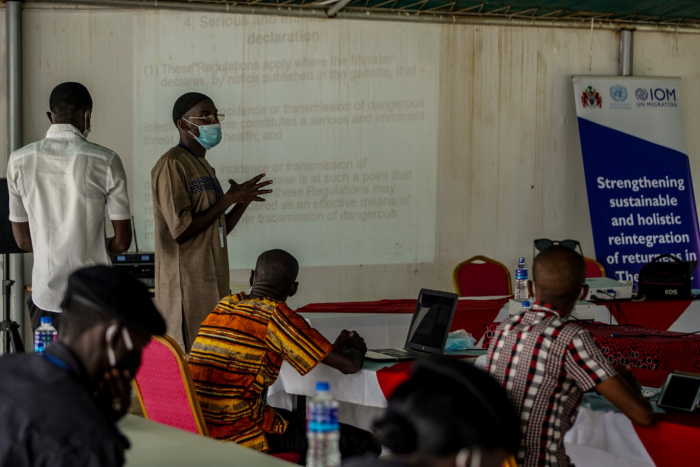
To cope with the situation, several hotels have been repurposed into quarantine centers, where healthcare workers and support staff are managing the pandemic every day.
To support quarantine centers in mitigating COVID-19’s spread, the International Organization for Migration (IOM), the World Health Organization (WHO) and the Ministry of Health organized a four-day training from 4-7 August on the fundamentals of infection prevention and control.
100 public health and clinical staff, fumigation and waste management staff, psychosocial and social workers, hotel and security workers, and drivers were trained on the proper use of personal protective equipment, sample collection safety techniques, comprehensive case management and effective risk communication.
This training was particularly crucial for hotel workers, like police officer Seedy M. Wally, who are at the frontline of response efforts without a medical background.
“As a security personnel, it is my job to guide those in quarantine to follow proper guidelines, counsel those who attempt to escape and ensure everyone completes their mandatory quarantine period. From this training, I can further orient my colleagues on precautionary measures while they patrol the centers,” expressed Wally.
The provision of mental health and psychosocial support (MHPSS) was further incorporated into the training, with isolation taking a toll on the wellbeing of quarantine residents. “Counseling skills are key while working in these centers,” declared Mariama Badjie.
“Here we have the opportunity to better understand how to listen, observe and effectively communicate, in order to deal with challenges at the centers”, she adds.
“Healthcare workers and support staff bear a much higher risk of exposure to COVID-19. This training emphasizes the need for them to adhere to proper protocol and reinforce them when dealing with confirmed or suspected cases,” remarked Dr. Simeonette De Asis, IOM’s Migration Health Officer in The Gambia. “Furthermore, mainstreaming MHPSS principles into the training will hopefully boost staff morale—enabling them to provide quality counseling and support to quarantine residents.”
The training was made possible with support from the UN Peacebuilding Fund.
Read Other Articles In National News




